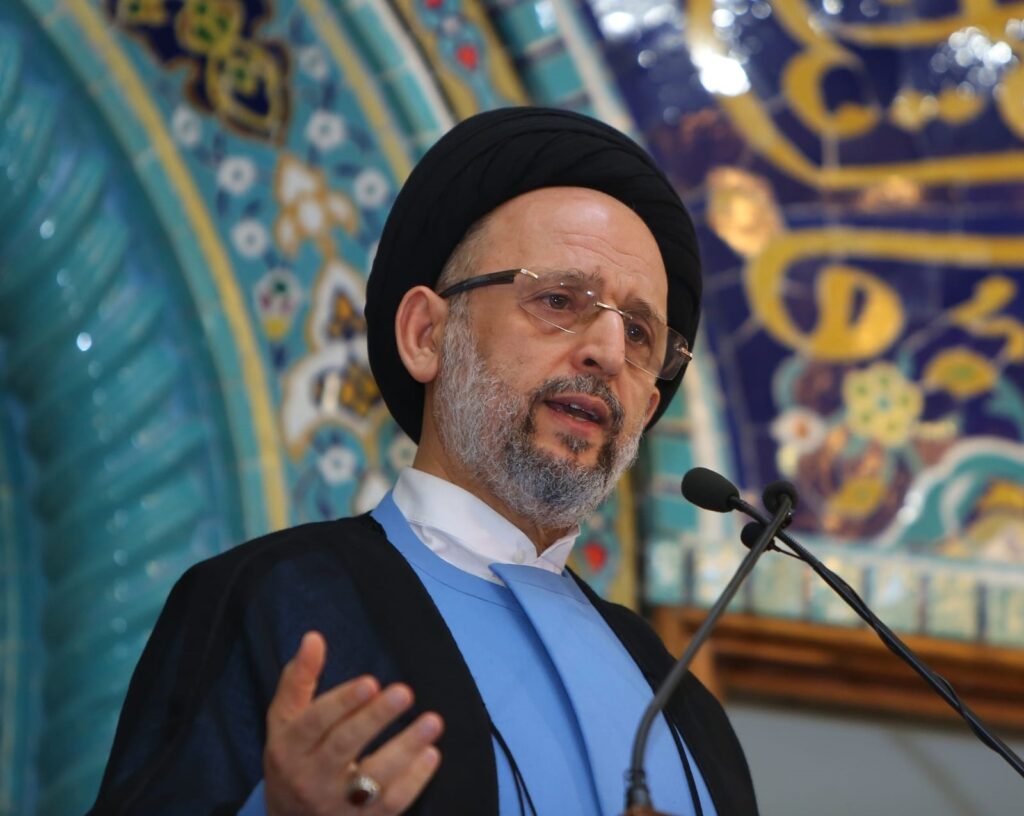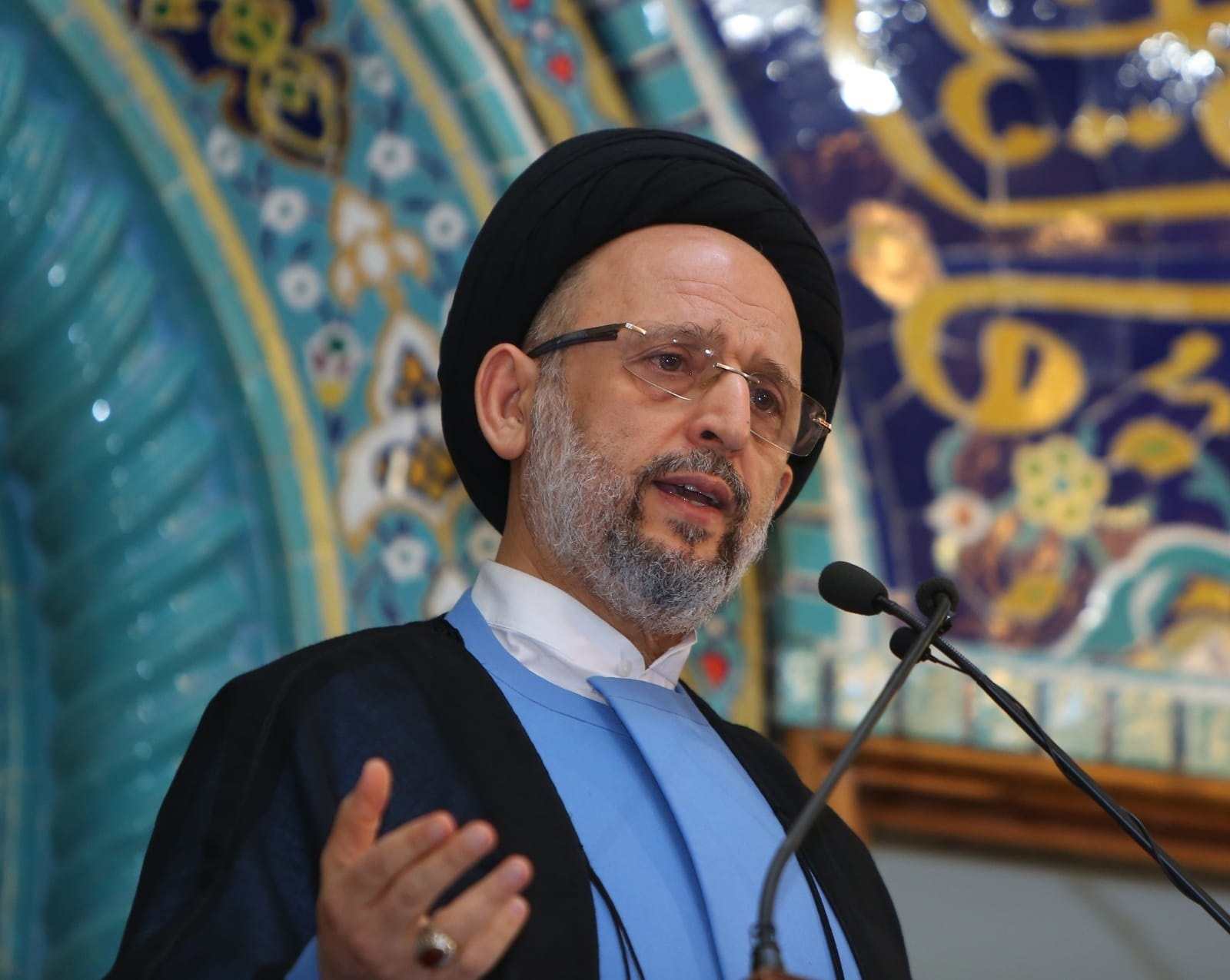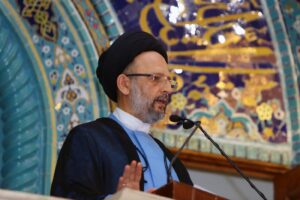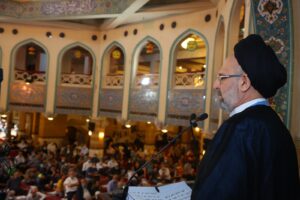In The Name of Allah, The Compassionate, The Merciful. What being a Shiite of Imam Ali (a.s.) means
His Eminence, Sayyed Ali Fadlullah, delivered the two Friday prayer sermons at the Imamain Al-Hassanain Mosque, Rajab 15, 1445 /January 26, 2024. Several prominent religious scholars, dignitaries, and hundreds of believers attended the Jumu’a prayer. Following is a summary of the sermons.
The First Sermon
“Allah, the Most Exalted, says in His Glorious Book: “Indeed, Allah desires to remove from you the impurity, O people of the Household, and purify you with a thorough purification.” Allah, The Most Exalted speaks the Truth.
On the thirteenth of the month of Rajab, the blessed birth occurred of one of those whom this holy Ayat was revealed, they are the ones upon whom Allah’s will was manifested to remove impurity from them and purify them thoroughly. He is the Commander of the Believers, Ali ibn Abi Talib (a.s.). Allah chose for his birth the holiest and noblest spot, in the Sacred House, a birth that never happened before him nor would it occur after him. He had the privilege of being raised by the Messenger of Allah (p.), nurtured and cared for by him from the age of six, lightening the burden on his father, Abu Talib, who had many dependents. He received knowledge, prudence, and great moral character from the Prophet (p.), as the Imam indicated in one of his sermons in Nahj al-Balagha: “I used to follow him like a baby camel following its mother, day after day, learning from his manners and ordering me to emulate his actions.”…
When JIbril descended with the message to the Messenger of Allah, Ali was the first among the people to embrace Islam. He affirmed this when he said: “O Allah, I am the first to respond, hear, and obey”…
Ali (a.s.) supported the Messenger of Allah (p.) from the beginning of his mission. On the day this Ayat was revealed, “And warn your close kindred” the Prophet (p.) asked his family, “Who among you will support me in this matter?” Only Ali (a.s.) stood up, saying, “I will, O Messenger of Allah.”
From that day onwards, He did not hesitate to offer his life for the Prophet (p.). And when Quraysh decided to assassinate him while he lay on his bed Ali (a.s.) offered to sleep in his bed. Despite knowing that this act could cost him his life, Ali only asked, “would you be safe, O Messenger of Allah?” When the Prophet (p.) affirmed saying that this is what Allah, The Most Exalted, has promised him, he replied, “Go where you have been commanded.” At that moment, this Ayat was revealed, “And among the people is he who sells himself, seeking the pleasure of Allah,
Ali (a.s.), also, led in all the battles fought by the Messenger of Allah against the polytheists and Jews. He excelled in the battles of Badr, Uhud, Khaybar, and Hunayn, proving himself as the hero in every war he engaged in, ensuring victory for the Muslims. He was also a beacon of knowledge, representing the teachings of the Prophet (p.), as he was the gate to the city of his knowledge, for the Prophet stated: ‘I am the city of knowledge, and Ali is its gate. Whoever wishes to enter the city should do so through the gate of Ali.
Ali also mentioned, ‘The Messenger of Allah taught me a thousand branches of knowledge, each one opening to a thousand more.’ The Prophet also said to him, ‘You are to me like Haroun was to Musa except that there is no prophet after me.”
Before the Prophet (p.) departed from this world, he entrusted Ali (a.s.) with the responsibility of safeguarding Islam after him. Ali was the only one capable of carrying this trust and leading the Muslim community. The days and events that followed confirmed this reality.
When asked about why he preferred Ali to others As Khalil ibn Ahmad al-Farahidi said, ‘Everyone’s need for him and his independence from everyone is evidence that he is the Imam for all…’
He added: “What can I say about a man whose enemies hid his virtues out of envy and his loved ones out of fear, yet what remained filled the two worlds.”
Today on the occasion of his birth, we are going to seize this opportunity to point out to these traits not only to glorify the Imam, but also to see if we are really adopting his traits and practicing them and by that we are actually among his followers and Shiites.
The first stance: When Malik al-Ashtar said to him, “O Commander of the Faithful… Our number is decreasing, and you are leading them with justice. If you expend wealth, O Commander of the Faithful, the hearts of men will incline towards you …” The Imam replied, “As for what you mentioned about our actions and conduct are carried with justice, indeed Allah says: ‘Whoever does righteousness, it is for his [own] soul, and whoever does evil, it is against it. And your Lord is not ever unjust to the servants.‘ I am more afraid from falling short of what you mentioned. As for what you said about the difficulty of adhering to the truth for them, and therefore they left us, Allah knows that they did not leave us due to oppression, nor did they resort to justice when they left us. They sought nothing but the worldly gains… They will be questioned on the Day of Resurrection: Did they seek the world, or did they act for the sake of Allah?” Al-Ash’atr replied, “By Allah, you have spoken the truth, O Commander of the Faithful.”
Ali (a.s.) had the ability to win the hearts of tribal leaders, influential individuals, and the people around him, but he was not interested in gaining mere admirers or friends at the expense of the principles of Islam and the welfare of the people for which he dedicated his life.
The second stance: In the Battle of Siffin,
when his commanders suggested depriving Muawiyah’s army of water as this army had denied them the access of water before they were driven away, Ali (a.s.) refused and instead allowed them access to the water. He said, ‘I will not retaliate in the same manner as they have. Make way for them to drink…’
The third stance, his statement: “I indeed dislike that it crosses your minds that I love flattery and enjoy hearing praises. By the grace of Allah, I am not like that. If I were to love to hear such things, I would have abandoned it for the sake of Allah, the Exalted. So, do not address me as the arrogant ones are addressed … Do not think of me as being reluctant to hear the truth or seeking esteem for myself. For verily, whoever is reluctant to accept the truth or turns away from justice, it will be heavier on him to act by them. Therefore, do not refrain from presenting the truth or seeking consultation with justice…”
Then, he turned to his tribe from the Bani Abdul Muttalib and said: “O sons of Abdul Muttalib, I do not want you to engage in shedding the blood of Muslims, claiming, ‘The Commander of the Faithful has been killed.’ Only kill the one who killed me. If I die from a blow like this, then strike him a blow in return, but do not mutilate the man. I heard the Messenger of Allah (p.) say, ‘Avoid mutilation, even in the case of a rabid dog.'”
Through this, Imam Ali (a.s.) wanted to teach us the courage to criticize rulers and officials in any position, whether religious, social, or political. He emphasized not to flatter or remain silent about their mistakes, whether out of a desire to gain favor or fear. He wanted rulers and officials, no matter how high their positions, not to see themselves above criticism.
Dear loved ones; this is Ali in his ethics, justice, knowledge, and humanity. Belonging to Ali is not just about expressing feelings and emotions, or declaring loyalty to him. It is about embracing all the values he lived by, and to what he called us, when he said, “You know that your imam is contented with two pieces of bread as his food and two rags as his cloths. Certainly you cannot do so but at least try to help me with piety and uprightness”
In this way, we deserve to be among his followers and Shia under his banner, being an adornment to him, not a blemish upon him.
The second sermon
I advise you and myself, O worshippers of Allah, with what the Commander of the Faithful (a.s.) advised his companions when he said to them: ‘Indeed, this world that you desire and seek, and that angers and pleases you, is not your permanent abode. It is not the home you were created for, nor the place to which you are invited. Indeed, it is not lasting for you… Hasten towards the abode to which you are invited … and complete the blessings of Allah upon you with patience in obeying Him and preserving what His Book has entrusted to you. Verily, losing something of your worldly possessions after preserving your religious principles will not harm you…But after losing your religion, nothing you preserved from your worldly affairs will benefit you. May Allah guide our hearts and yours to the truth and grant us patience.’
This is the advice of the Commander of the Faithful (a.s.). If we adhere to it, we will know where we are heading and how to proceed. Thus, we will be better off in our worldly life, successful in the Hereafter, and capable of facing challenges…
Starting with Gaza, where the Zionist enemy continues its systematic destruction of all aspects of infrastructure and buildings, rendering it uninhabitable. Moreover, there seems to be no indication that this entity is willing to listen to the voices calling for an end to the bloodshed and destruction. Even when it expresses a willingness to negotiate, it insists on negotiations under its ongoing aggression. Perhaps what encourages this obstinacy is the consistent international support and the coverage it receives, shielding it from accountability and punishment. While there have been shifts in the positions of some countries supporting it, the change is yet to manifest in a decisive and deterrent stance against the enemy and not only wishes.
Meanwhile, the Palestinian people persist in their brave resistance, confronting the enemy despite the imbalance in capabilities to prevent him from achieving his goals… The heroic operations occurring daily testify to the determination and bravery of the Palestinian people. The recent bold operation in “Al-Maghazi” exemplifies this, shaking the foundation of the enemy and deeming it a dark and terrible day.
We congratulate the Palestinian resistance on its achievements and heroism, reinforcing the hope that this steadfast nation will withstand any attempt to break it. It has the capability to defeat the enemy, thwart its plans, and secure its rights. The Palestinian people have become more aware that their only option is to continue this path of resistance, bear the burdens it entails, and endure with patience. Any other option will not guarantee their basic rights, a dignified life, freedom, and security – rights that they deserve like any other nation. They are confident that victory comes after suffering, relief comes with hardship, and that with hardship comes ease.
And certainly, they will not stand alone on this path. There are those who see it as their responsibility to be a support for this people and a champion for their just cause.
Returning to this country, it is currently experiencing a political movement both internally and externally, aiming to lead it out of the state of uncertainty regarding the presidential election and pave the way for its progress in economic and social fields and face the regional challenges.
We hope that these efforts succeed and continue, and that the obstacles standing in the way of this process are removed. However, there is a fear that resolving these issues may not be easy, and the country might remain in a state of waiting until the regional situation becomes clearer, particularly in Gaza.
At the same time, the Lebanese people anxiously watched the approval of the budget, fearing additional burdens that might increase their suffering. Unfortunately, this budget seems to relieve the wealthy and add to the burdens of the poor. It lacks any plan for economic recovery, financial improvement, or redirecting state funds and resources. There is no evident effort to recover plundered or wasted funds, nor any attempt to restore the funds of depositors.
It is regrettable that the mentality governing this country has not changed despite experiences, challenges, and difficult circumstances.
Returning to the bleeding wound in southern Lebanon, the Zionist enemy continues its aggressive practices against its villages, extending to areas far from the Lebanese borders. These actions are accompanied by the threats of the Enemy’s security and political leaders.
In light of these events, we emphasize the necessity for unity among the Lebanese people to face this phase and avoid any internal disputes that may weaken the domestic front. Such disputes would serve as free service to the enemy. It is crucial to be prepared to confront any potential adventure the enemy might engage in, even though it is unlikely, given his awareness of what he would face in case he does. However, we cannot deny the possibility in the face of the treachery of an enemy that seeks revenge against a country that defeated and expelled it from this land, humiliated and diminished.





